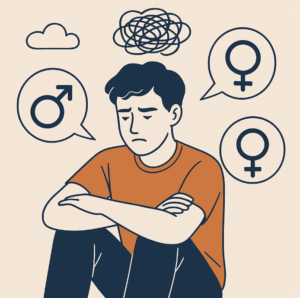How Sexuality and Identity Evolve During Adolescence — and When to Worry
 Adolescence is often described as a “second birth.” It’s the stage when the body changes rapidly, emotions run strong, and teenagers begin to ask deeper questions: Who am I? Whom am I attracted to? Where do I belong?
Adolescence is often described as a “second birth.” It’s the stage when the body changes rapidly, emotions run strong, and teenagers begin to ask deeper questions: Who am I? Whom am I attracted to? Where do I belong?
For most young people, this period is full of discovery and gradual confidence-building. But for some, it can also bring confusion, distress, or even mental health problems. Understanding how sexuality and identity normally develop — and what happens when things go off-track — is important for parents, educators, and young people themselves.
The Normal Journey of Sexuality and Identity
Early Adolescence (10–13 years)
-
Puberty brings new sensations, curiosity, and self-awareness.
-
Crushes and fantasies begin, though often still vague or confusing.
-
Friendships are strong but mostly with the same gender.
Middle Adolescence (14–16 years)
-
Sexual feelings intensify. Dating, flirting, or experimenting may begin.
-
Teenagers compare themselves with peers and feel pressure to “fit in.”
-
Mood swings and conflicts with parents are common.
Late Adolescence (17–19 years and beyond)
-
Sexual orientation and preferences become clearer.
-
Values, career goals, and long-term identity start to settle.
-
The ability to form intimate relationships without losing individuality develops.
What Shapes This Process?
-
Biology: hormones, brain development, and genetics.
-
Psychology: self-esteem, resilience, and personality style.
-
Social factors: family expectations, peer influence, cultural norms, and media exposure.
-
Adverse experiences: bullying, rejection, or trauma can complicate identity development.
When Things Get Difficult: Common Disorders
1. Identity Confusion (Identity Diffusion)
-
Struggling to define “who I am.”
-
Fluctuating self-image, unstable relationships, emptiness.
-
Often seen in personality disorders.
2. Gender Dysphoria
-
Distress when gender identity doesn’t match assigned sex.
-
Desire to live as another gender, dislike of sexual characteristics.
-
Needs sensitive support and careful evaluation.
3. Obsessive Sexual Doubts (often seen in OCD)
-
Repeated intrusive thoughts: “What if I’m attracted to the same gender?” even if attraction remains toward the opposite gender.
-
Leads to checking behaviors (watching porn, seeking reassurance).
-
Not a change in orientation — but an anxiety-driven loop.
4. Paraphilic Disorders (rare in adolescence)
-
Intense, distressing urges toward non-normative targets (exhibitionism, voyeurism, etc.).
-
Requires professional assessment if harmful or persistent.
5. Depression and Anxiety Affecting Sexual Identity
-
Negative self-image (“I’m not manly/womanly enough”).
-
Reduced confidence in relationships.
Warning Signs Parents and Teens Should Notice
-
Persistent distress about gender or sexuality.
-
Obsessive doubts or compulsive reassurance-seeking.
-
Self-harm, withdrawal, or constant negative thinking.
-
Strong disgust or hatred toward one’s body.
-
Risky or harmful sexual behaviors.
How Can We Help?
-
Early assessment by a mental health professional.
-
Psychoeducation: normalizing doubts, explaining what’s healthy curiosity vs. obsession.
-
Therapy:
-
CBT and exposure-response prevention for intrusive doubts.
-
Supportive identity-focused therapy for confusion and low self-esteem.
-
Family therapy when conflicts or stigma are involved.
-
-
Medication: SSRIs or anti-anxiety medicines when thoughts and anxiety are overwhelming.
-
Supportive environment: empathy, acceptance, and safe spaces for self-expression.
Takeaway
Adolescence is a natural period of exploration. Most young people eventually find clarity in who they are and whom they are attracted to. But when confusion turns into obsession, distress, or self-harm, it is no longer just “teenage angst.” Recognizing the difference — and seeking timely support — can make all the difference in helping adolescents grow into confident, healthy adults.
👨⚕️ Consultation
I’m Dr. Srinivas Rajkumar T, Consultant Psychiatrist at Apollo Clinic, Velachery, Chennai.
I work with adolescents and adults dealing with issues related to identity, anxiety, intrusive thoughts, depression, and sleep problems. My approach combines structured therapy with safe, evidence-based use of medication — focusing on long-term well-being rather than quick fixes.
📞 Contact: +91 8595155808